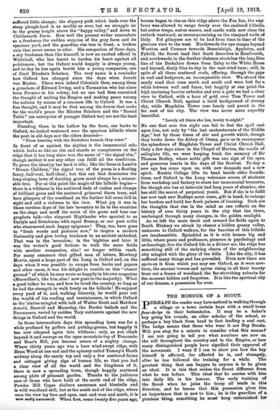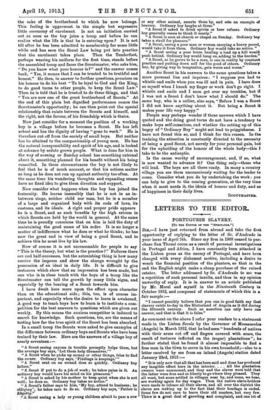THE HONOUR OF A SCOUT.
170ERHAPS the reader may have noticed in walking through a village or a town certain boys with a small brass fleur-de-lys in their buttonholes. It may be a baker's boy going his rounds, an older scholar of the school, or perhaps a boy black from head to foot leading a coal cart. The badge means that those who wear it are Boy Scouts. Will you stop for a minute to consider what this means? I am not going to tell you what numbers are now on the roll throughout the country and in the Empire, or how many distinguished people have signified their approval of the movement. I want if I can to show you how the boy himself is affected, for affected he is, and strangely, after he has followed the training for a while. The greatest thing that can happen to anyone is to be given an ideal. It is this that makes the Scout different from what he was before. This ideal that he carries with him into daily life is his honour. The early training of the Scout when he joins the troop all tends in this direction, and he learns that this possession gives him an importance that is new to him ; he is the guardian of a precious thing, something he must keep untarnished for
the sake of the brotherhood to which he now belongs.
This feeling is uppermost in the simple but expressive little ceremony of enrolment. Is not an initiation carried out as soon as the boy joins a troop and before he can realize what the life is that he is entering upon ? It is not till after he has been admitted to membership for some little
while and has seen the Scout Law being put into practice that the enrolment takes place. Then the Tenderfoot, perhaps wearing his uniform for the first time, stands before the assembled troop and faces the Scoutmaster, who asks him, "Do you know what your honour is P" and the answer comes back, "Yes, it means that I can be trusted to be truthful and honest." He then, in answer to further questions, promises on his honour to do his best "To be loyal to God and the King, to do good turns to other people, to keep the Scout Law." Then he is told that be is trusted to do these things, and that "You are now one of the great brotherhood of Scouts." At the end of this plain but dignified performance comes the Scoutmaster's opportunity ; he can then point out the special relationship that exists between the Scouts and himself, and the right, not the favour, of his friendship which is theirs. Now just consider for a moment the position of a working boy in a village before he becomes a Scout. He has left school and has the dignity of having "gone to work." He is therefore cut oil from the society of small boys. But neither has he attained to the companionship of young men. He has the natural irresponsibility and spirit of his age, and is looked at askance by sedate grown people. What is done for him in the way of evening or Sunday school has something external about it, something planned for his benefit without his being consulted. In these circumstances the boy is not likely to feel that he is of much account, or that his actions matter so long as he does not run up against authority too often. At the same time his wandering thoughts and expanding senses have no fixed idea to give them direction and support.
Now consider what happens when the boy has joined the fraternity. He learns insensibly that he is not in an in- between stage, neither child nor man, but he is a member of a large and organized body with its code of laws, its customs, and its ideals. A right and proper pride appears he is a Scout, and as such benefits by the high esteem in which Scouts are held by the world in general. At the same time he is proudly conscious that on him is laid the duty of maintaining the good name of his order. It is no longer a matter of indifference what he does or what he thinks; he has now the great end in view of being a good Scout, and to achieve this he must live by his law.
Now of course it is not unreasonable for people to say "This is the theory, but what is the practice ?" Failures there are and half-successes, but the astonishing thing is how many receive the impress and show the change wrought by the possession of an ideal in daily life. It is difficult to give instances which show that an impression has been made, but one who is in close touch with the boys of a troop like the Scoutmaster can tell the growth by many little signs, and especially by the bearing of a Scout towards him.
I have dwelt here more upon the effect upon character
than on the educational side ; this, too, is of course im- portant, and especially when the desire to learn is awakened. A good way to teach boys how to learn is to institute a com- petition for the best answers to questions which are given out
weekly. By this means the anxious competitor is induced to search for knowledge. Such questions, too, are the means of testing how far the true spirit of the Scout has been absorbed.
In a small troop the Scouts were asked to give examples of the difference between ordinary boys and Scouts who have been trained by their law. Here are the answers of a village boy of nearly seventeen:—
"A Scout seeing anyone in trouble promptly helps them, but the average boy says, 'Let them help themselves.'"
"A Scout when he picks up money or other things, tries to find the owner. Ordinary boy says, 'Findings is keepings."
"A Scout sent on an errand does so quickly. Ordinary boy loiters."
" A Scout if put to do a job of work ; he takes pains in it. An ordinary boy would have his mind on his pleasures."
"A Scout is asked by his mother to keep quiet when she is not well; he does so. Ordinary boy takes no notice."
"A Scout's father says to him, 'My boy, attend to business ; be obliging'; he takes care to do so. Ordinary boy says, 'Father is fidgetty." "A Scout seeing a lady or young children afraid to pass a cow
or any other animal, escorts them by, and sets an example of bravery. Ordinary boy laughs at them."
"A Scout if asked to drink spirits or beer refuses. Ordinary boy generally seems to think it manly." "A Scout is seen at church or chapel on Sunday. Ordinary boy takes a stroll for pleasure." "A Scout, seeing a poor man or woman carrying a heavy parcel, would take it from them. Ordinary boy would take no notice."
"A Scout seeing a poor horse hauling a load up a hill would push behind. Ordinary boy would hang on, adding to the burden."
"A Scout, as be grows to be a man, is one in reality by constant practice and putting down self for the good of others. Ordinary boy, by giving way to temptation, gets worse and worse."
Another Scout in his answers to the same questions takes a more personal line and inquires : "I suppose you had to whistle and smile when you was ill and in pain. I have done so myself when I knock my finger or work don't go right. I whistle and smile and I soon get over my troubles, but if
I was not a Scout I don't know what I should do." The same boy, who is a collier, also says, "Before I was a Scout
I did not know anything about it. But being a Scout it makes your life very happy."
People may perhaps wonder if these answers which I have quoted and the doing good turns do not have a tendency to
make boys self-conscious, and whether the setting up of this bogey of "Ordinary Boy" might not lead to priggishness. I
have not found this so, and I think for this reason. In the training the attention is constantly directed to the necessity of being a good Scout, net merely for your personal gain, but for the upholding of the honour of the whole body—this I take to be the antiseptic.
Is the cause worthy of encouragement, and, if so, what is now wanted to advance it? One thing only—those who will lead. The boys are all there ready. In many a country village you see them unconsciously waiting for the leader to come. Consider what you do by undertaking the work : you can help to give to the coming generation, at the very time when it most needs it, the ideals of honour and duty, and so of happiness in their daily lives.
SCOUTMASTER.











































 Previous page
Previous page